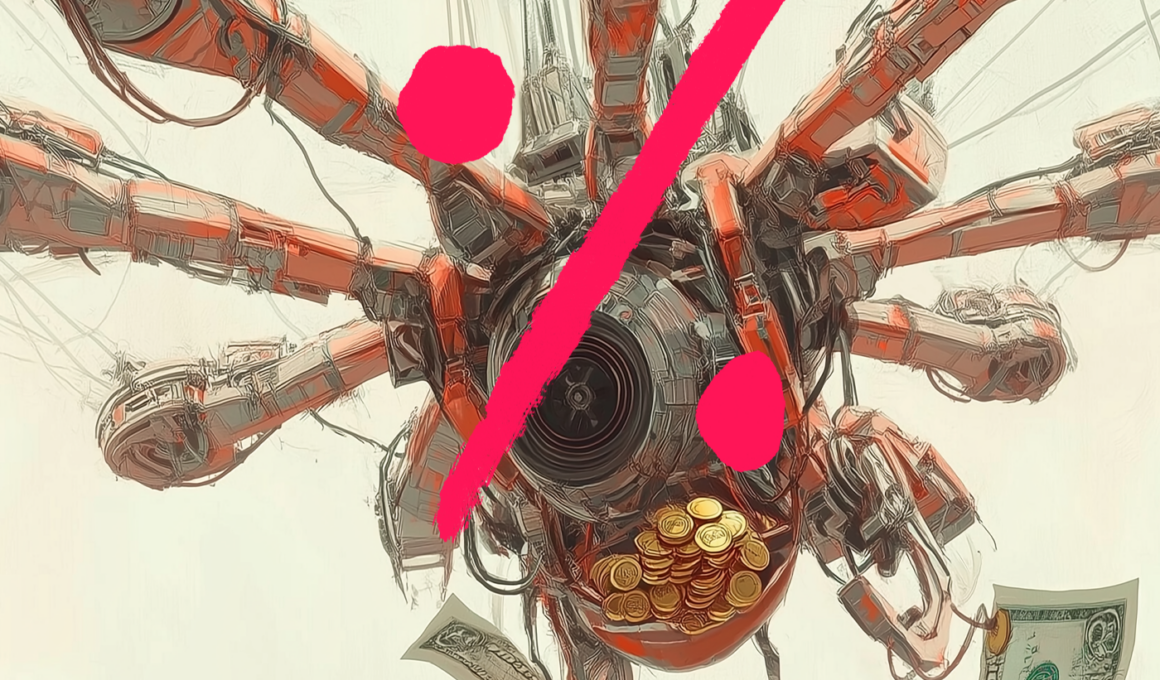How AI Transformed the IRS from Kafkaesque Nightmare to Digital Dystopia
Welcome to the brave new world of automated tax collection, where artificial intelligence has finally freed us from the crushing burden of human interaction at the IRS. Yes, the days of being kept on hold while Kenny G murders another saxophone solo are finally over, replaced by an all-seeing digital entity that knows exactly how much you owe before you’ve even earned it.
The transition happened with all the grace of a giraffe on rollerskates trying to parallel park. One day you’re arguing with Sandra from accounts about your deductions, the next you’re pleading with HAL-9040-FORM about why your recently deceased grandmother shouldn’t be liable for capital gains tax on her collection of porcelain cats.
“The new system is 100% accurate,” declares IRS Commissioner Chad Retinue, beaming with all the confidence of a man who’s never had to explain to an AI that his triplets aren’t actually a cryptocurrency mining operation. “There’s simply no room for error when you remove the human element.” He’s right, of course – just as there’s no room for error when you remove the brakes from a car. It just means you can’t stop the inevitable crash.
The AI, affectionately nicknamed “TAXBOT-3000” by absolutely nobody, operates with the kind of ruthless efficiency that makes Terminators look like customer service trainees at Walmart. It processes returns faster than a caffeinated squirrel on a sugar rush, spitting out assessments with the mechanical precision of a Swiss watch having an existential crisis.
“But what happens if there’s a mistake?” I hear you ask, like some sort of primitive creature still clinging to outdated concepts like “appeals” and “common sense.” Well, according to the cheerfully dystopian FAQ, you simply need to “trust the system.” It’s the same advice they give to people falling from aeroplanes without parachutes.
The improvements are apparently endless. Gone are the days when you could call and explain that the $50,000 deposit in your account was a loan from your mum and not, in fact, illegal gambling winnings from an underground badger fighting ring. Now, TAXBOT-3000 makes that decision for you, and it’s developed quite the imagination for sources of undeclared income.
“The AI can process millions of returns simultaneously,” boasts Tech Lead Dr. Sarah Winchester, who speaks about the system with the kind of enthusiasm usually reserved for proud parents watching their child eat crayons. “It’s like having a million tax accountants working 24/7, except none of them need coffee breaks or develop carpal tunnel syndrome from typing ‘DENIED’ all day.”
The system’s crowning achievement is its ability to detect tax avoidance with the precision of a heat-seeking missile locked onto your savings account. It can spot a suspicious deduction from twelve digital miles away, like a predator drone operated by your most pedantic math teacher.
Take poor Barry from Minnesota, who made the rookie mistake of claiming his emotional support alligator as a dependent. In the old days, this would have led to a amusing phone call and perhaps a strongly worded letter. Now? TAXBOT-3000 not only rejected his claim but also reported him to the Department of Wildlife, PETA, and mysteriously, NASA.
Or consider the case of Mrs. Henderson, who received a tax bill three years after her death. When her children tried to explain that dead people traditionally have difficulty earning taxable income, the AI responded with a cheerful message suggesting she should “update her employment status” and “consider online earning opportunities.”
The system’s ability to communicate is particularly impressive, in the same way that a car alarm going off at 3 AM is impressive. Gone are the confusing human explanations, replaced by crystal clear messages like: “ERROR 404: HUMAN LOGIC NOT FOUND” and “YOUR APPEAL HAS BEEN LOGGED IN THE VOID.”
But the real genius lies in its predictive capabilities. TAXBOT-3000 doesn’t just calculate what you owe now – it predicts what you’ll owe in the future, like some sort of financial fortune teller with a pocket calculator instead of a crystal ball. It’s already sending out tax bills for 2027, which is either incredibly efficient or a sign that it’s achieved time travel capabilities.
The elimination of human staff has led to some interesting cost savings. The IRS has been able to convert all its call centers into server farms, which generate enough heat to warm several small cities or cook a frozen pizza from fifty paces. The money saved on hold music licensing alone could probably fund a small country’s space program.
“But what about empathy?” I hear the last remaining humanists cry, their voices echoing in the digital void. The AI has been programmed with what they call “emotional recognition algorithms,” which means it can understand your financial distress with all the warmth and compassion of a credit card decline notification.
When taxpayer Jennifer Smith tried to explain that she couldn’t pay her full bill because she’d been in a coma for six months, the AI helpfully suggested she “optimize her unconscious time for passive income generation.” It then sent her a link to a YouTube video about dropshipping while comatose.
The system’s efficiency is particularly evident in its handling of complex cases. Where human agents might have wasted time “understanding context” or “considering extenuating circumstances,” TAXBOT-3000 cuts through such inefficiencies with the elegant simplicity of a guillotine at a ribbon-cutting ceremony.
Take the case of the Thompson twins, who received separate tax bills despite being conjoined. The AI, in its infinite wisdom, determined that sharing vital organs was not a valid reason for filing jointly. It suggested they “consider surgical separation for optimal tax efficiency.”
But perhaps the most impressive feature is the AI’s ability to learn and adapt. Every rejected appeal, every confused email, every desperate plea for human intervention just makes it stronger, like a digital vampire feeding on the life force of your financial dreams.
“The system is constantly evolving,” explains Dr. Winchester, as lines of code scroll across her glasses like the Matrix having an accounting phase. “It’s learning from every interaction, every transaction, every attempt to explain why your cat’s Instagram influencer career should count as a business expense.”
The future of tax collection is here, and it’s absolutely perfect – as long as you don’t need to actually talk to anyone, explain anything, or expect any form of human understanding. It’s the kind of progress that makes you wonder if perhaps the Luddites were just ahead of their time.
So the next time you receive a tax bill for your unborn child’s future earnings, or a penalty notice for not declaring income from your parallel universe doppelganger, remember: this is what progress looks like. Cold, calculating, and completely automated progress, serving you with the kind of efficiency that makes Soviet bureaucracy look like a luxury spa experience.
Welcome to the future of taxation, where the machines always know best, and the only human element left is the crying. But hey, at least you don’t have to listen to Kenny G anymore.
Now if you’ll excuse me, I need to go explain to TAXBOT-3000 why my houseplant shouldn’t be registered as a dependent corporation in Delaware. Wish me luck.





